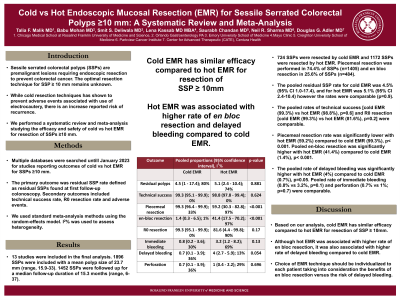Tuesday Poster Session
Category: Interventional Endoscopy
P3697 - Cold vs Hot Endoscopic Mucosal Resection for Sessile Serrated Colorectal Polyps ≥10 mm: A Systematic Review and Meta-Analysis
Tuesday, October 24, 2023
10:30 AM - 4:00 PM PT
Location: Exhibit Hall

Has Audio

Talia F. Malik, MD
Chicago Medical School at Rosalind Franklin University of Medicine and Science
North Chicago, IL
Presenting Author(s)
Talia F.. Malik, MD1, Babu Mohan, MD, MS2, Smit S.. Deliwala, MD3, Lena Kassab, MD, MBA4, Saurabh Chandan, MD5, Neil R.. Sharma, MD6, Douglas G. Adler, MD7
1Chicago Medical School at Rosalind Franklin University of Medicine and Science, North Chicago, IL; 2University of Utah Health School of Medicine, Salt Lake City, UT; 3Emory University School of Medicine, Atlanta, GA; 4Mayo Clinic, Rochester, MN; 5Creighton University School of Medicine, Omaha, NE; 6Parkview Cancer Institue, Fort Wayne, IN; 7Center for Advanced Therapeutic (CATE), Centura Health, Porter Adventist Hospital, Peak Gastroenterology, Denver, CO
Introduction: Sessile serrated colorectal polyps (SSPs) are premalignant lesions requiring endoscopic resection to prevent colorectal cancer. The optimal resection technique for SSP ≥ 10 mm remains unknown. While cold resection techniques has shown to prevent adverse events associated with use of electrocautery, there is an increase reported risk of recurrence. We performed a systematic review and meta-analysis studying the efficacy and safety of cold vs hot EMR for resection of SSPs ≥10 mm.
Methods: Multiple databases were searched untill January 2023 for studies reporting outcomes of cold vs hot EMR for SSPs ≥10 mm. The primary outcome was residual SSP rate defined as residual SSPs found at first follow-up colonoscopy. Secondary outcomes included technical success rate, R0 resection rate and adverse events. We used standard meta-analysis methods using the random-effects model. I2% was used to assess heterogeneity.
Results: 13 studies were included in the final analysis. 1896 SSPs were included with a mean polyp size of 23.7 mm (range, 15.9-33). 1452 SSPs were followed up for a median follow-up duration of 15.3 months (range, 6-37). 724 SSPs were resected by cold EMR and 1172 SSPs were resected by hot EMR. Piecemeal resection was performed in 74.4% of SSPs (n=1405) and en bloc resection in 25.6% of SSPs (n=484).The pooled residual SSP rate for cold EMR was 4.5% (95% CI 1.0-17.4), and for hot EMR was 5.1% (95% CI 2.4-10.4) however the rates were comparable (p=0.9). The pooled rates of technical success [cold EMR (99.3%) vs hot EMR (98.8%), p=0.6] and R0 resection [cold EMR (99.3%) vs hot EMR (81.6%), p=0.2] were comparable. Piecemeal resection rate was significantly lower with hot EMR (59.2%) compared to cold EMR (99.3%), p< 0.001. Pooled en-bloc resection was significantly higher with hot EMR (41.4%) compared to cold EMR (1.4%), p< 0.001. The pooled rate of delayed bleeding was significantly higher with hot EMR (4%) compared to cold EMR (0.7%), p=0.05. Pooled rate of immediate bleeding (0.8% vs 3.2%, p=0.1) and perforation (0.7% vs 1%; p=0.7) were comparable.
Discussion: Based on our analysis, cold EMR has similar efficacy compared to hot EMR for resection of SSP ≥ 10mm. Although hot EMR was associated with higher rate of en bloc resection, it was also associated with higher rate of delayed bleeding compared to cold EMR. Choice of EMR technique should be individualized to each patient taking into consideration the benefits of en bloc resection versus the risk of delayed bleeding.

Disclosures:
Talia F.. Malik, MD1, Babu Mohan, MD, MS2, Smit S.. Deliwala, MD3, Lena Kassab, MD, MBA4, Saurabh Chandan, MD5, Neil R.. Sharma, MD6, Douglas G. Adler, MD7. P3697 - Cold vs Hot Endoscopic Mucosal Resection for Sessile Serrated Colorectal Polyps ≥10 mm: A Systematic Review and Meta-Analysis, ACG 2023 Annual Scientific Meeting Abstracts. Vancouver, BC, Canada: American College of Gastroenterology.
1Chicago Medical School at Rosalind Franklin University of Medicine and Science, North Chicago, IL; 2University of Utah Health School of Medicine, Salt Lake City, UT; 3Emory University School of Medicine, Atlanta, GA; 4Mayo Clinic, Rochester, MN; 5Creighton University School of Medicine, Omaha, NE; 6Parkview Cancer Institue, Fort Wayne, IN; 7Center for Advanced Therapeutic (CATE), Centura Health, Porter Adventist Hospital, Peak Gastroenterology, Denver, CO
Introduction: Sessile serrated colorectal polyps (SSPs) are premalignant lesions requiring endoscopic resection to prevent colorectal cancer. The optimal resection technique for SSP ≥ 10 mm remains unknown. While cold resection techniques has shown to prevent adverse events associated with use of electrocautery, there is an increase reported risk of recurrence. We performed a systematic review and meta-analysis studying the efficacy and safety of cold vs hot EMR for resection of SSPs ≥10 mm.
Methods: Multiple databases were searched untill January 2023 for studies reporting outcomes of cold vs hot EMR for SSPs ≥10 mm. The primary outcome was residual SSP rate defined as residual SSPs found at first follow-up colonoscopy. Secondary outcomes included technical success rate, R0 resection rate and adverse events. We used standard meta-analysis methods using the random-effects model. I2% was used to assess heterogeneity.
Results: 13 studies were included in the final analysis. 1896 SSPs were included with a mean polyp size of 23.7 mm (range, 15.9-33). 1452 SSPs were followed up for a median follow-up duration of 15.3 months (range, 6-37). 724 SSPs were resected by cold EMR and 1172 SSPs were resected by hot EMR. Piecemeal resection was performed in 74.4% of SSPs (n=1405) and en bloc resection in 25.6% of SSPs (n=484).The pooled residual SSP rate for cold EMR was 4.5% (95% CI 1.0-17.4), and for hot EMR was 5.1% (95% CI 2.4-10.4) however the rates were comparable (p=0.9). The pooled rates of technical success [cold EMR (99.3%) vs hot EMR (98.8%), p=0.6] and R0 resection [cold EMR (99.3%) vs hot EMR (81.6%), p=0.2] were comparable. Piecemeal resection rate was significantly lower with hot EMR (59.2%) compared to cold EMR (99.3%), p< 0.001. Pooled en-bloc resection was significantly higher with hot EMR (41.4%) compared to cold EMR (1.4%), p< 0.001. The pooled rate of delayed bleeding was significantly higher with hot EMR (4%) compared to cold EMR (0.7%), p=0.05. Pooled rate of immediate bleeding (0.8% vs 3.2%, p=0.1) and perforation (0.7% vs 1%; p=0.7) were comparable.
Discussion: Based on our analysis, cold EMR has similar efficacy compared to hot EMR for resection of SSP ≥ 10mm. Although hot EMR was associated with higher rate of en bloc resection, it was also associated with higher rate of delayed bleeding compared to cold EMR. Choice of EMR technique should be individualized to each patient taking into consideration the benefits of en bloc resection versus the risk of delayed bleeding.

Figure: FIgure 1. PRISMA flow chart for literature search and study selection
Disclosures:
Talia Malik indicated no relevant financial relationships.
Babu Mohan indicated no relevant financial relationships.
Smit Deliwala indicated no relevant financial relationships.
Lena Kassab indicated no relevant financial relationships.
Saurabh Chandan indicated no relevant financial relationships.
Neil Sharma indicated no relevant financial relationships.
Douglas Adler indicated no relevant financial relationships.
Talia F.. Malik, MD1, Babu Mohan, MD, MS2, Smit S.. Deliwala, MD3, Lena Kassab, MD, MBA4, Saurabh Chandan, MD5, Neil R.. Sharma, MD6, Douglas G. Adler, MD7. P3697 - Cold vs Hot Endoscopic Mucosal Resection for Sessile Serrated Colorectal Polyps ≥10 mm: A Systematic Review and Meta-Analysis, ACG 2023 Annual Scientific Meeting Abstracts. Vancouver, BC, Canada: American College of Gastroenterology.
